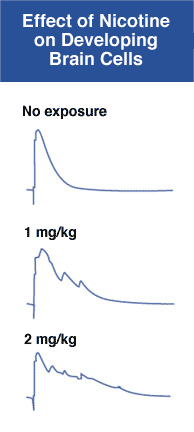 To determine the effect of nicotine on developing brains in the auditory cortex (the part of the brain where sounds are associated with meanings), researchers measured an electrical property (excitatory postsynaptic potential or EPSP) that influences the transmission of signals from one nerve cell to another. In animals not exposed to nicotine (top), neurons exhibited smooth short-duration EPSPs. Nerve cells from animals exposed daily to nicotine at doses of 1 mg/kg (middle) and 2 mg/kg (bottom) during the second week after birth exhibited longer duration EPSPs marked by frequent spikes, which interfere with effective transmission.
To determine the effect of nicotine on developing brains in the auditory cortex (the part of the brain where sounds are associated with meanings), researchers measured an electrical property (excitatory postsynaptic potential or EPSP) that influences the transmission of signals from one nerve cell to another. In animals not exposed to nicotine (top), neurons exhibited smooth short-duration EPSPs. Nerve cells from animals exposed daily to nicotine at doses of 1 mg/kg (middle) and 2 mg/kg (bottom) during the second week after birth exhibited longer duration EPSPs marked by frequent spikes, which interfere with effective transmission.Exposure to nicotine during a brief but crucial stage of brain development in rats appears to cause long-lasting disruption of some brain functions. NIDA-supported researchers Dr. Frances Leslie, Dr. Raju Metherate, and colleagues at the University of California, Irvine, found that nicotine injected into rats throughout the second postnatal week affected development of an area of the brain that is concerned with the interpretation of sounds, and that the effects persisted for at least 10 days after nicotine injections were discontinued.
"There are critical periods during which nicotine exposure can produce profound changes in brain function," Dr. Leslie says. "Our study suggests that the nicotine content of tobacco triggers responses in developing brains that are strikingly different from those in an adult brain."
In rats, there is a dramatic increase during the second postnatal week in the number of nicotinic acetylcholine receptors-brain cell structures that are sensitive to nicotine and help regulate the action of the chemical messenger acetylcholine. Developments in the rat brain during this period correspond to changes that take place in human fetuses during the last weeks of gestation.
To evaluate the effect of nicotine during this period of brain development, the researchers injected rat pups twice each day with saline or with nicotine (1 or 2 mg per kilogram of weight-levels typically used by researchers to simulate exposure levels thought to occur in human fetuses due to maternal smoking) for 1 week (postnatal days 8 through 14). Two other groups of rats received injections (2 mg/kg) on postnatal days 1 through 8 and on postnatal days 20 through 25, respectively. The researchers then measured electrical properties of brain cells in the auditory cortex to determine the cells' ability to properly process electrical signals involved in hearing. They found that cells from animals exposed to nicotine-at doses of 1 or 2 mg/kg-during the second postnatal week had significant impairment while those exposed to the higher dose earlier or later did not.
"Together, these findings indicate that chronic nicotine exposure during week 2, but not before or after, alters development in the auditory cortex of rats," Dr. Leslie says. The resulting defects do not impair the animals' ability to distinguish sounds-they are not hard of hearing-but the defects make the rats less able to associate sounds, such as the yips of littermates, with specific activities such as feeding, according to the researchers. "In humans, maternal smoking has been associated with cognitive deficits in infants, and particularly with auditory-related cognitive impairments such as reduced ability to orient toward clearly heard sounds. This animal study suggests a mechanism that might underlie these impairments," Dr. Leslie says.
Source
- Aramakis, V.B.; Hsieh, C.Y.; Leslie, F.M; and Metherate, R. A critical period for nicotine-induced disruption of synaptic development in rat auditory cortex. Journal of Neuroscience 20(16):6106-6116, 2000. [Abstract]; [Full Text]
